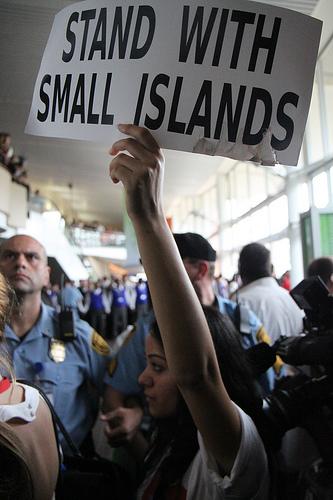International climate negotiations, like those now grinding through their second week in Durban, South Africa, are generally rife with spin and counter spin. Governments, media, business groups – even non-profits – vie to get their messages to trump the rest.

Protesters have made their presence known at Durban. Photo by powless.
The messaging frenzy at this year’s climate talks is over whom to blame for a lack of serious action to match both the need to reduce greenhouse gas pollution by least 85% by mid-century and the need for financial support in developing countries to deal with the realities of a warmer world.
The latest strategy from the press and some development and environment groups seems to be calling countries now emerging on the economic scene climate villains while giving truly recalcitrant countries like the US – which still has no hope of climate regulation at home – a pass.
Call me naïve, but do headlines like “Durban climate talks ‘roadmap’ held up by India” really reflect the forces pushing an alarmingly insufficient response to an increasingly imminent planetary emergency?
Let’s have a reality check.
Although it’s home to only 4 percent of the world’s population, the United States is responsible for 29 percent of carbon emissions over past 150 years, triple China’s share. On average, each person in the US emitted 720 tons of CO2 per year from 1960 to 2005. That’s almost fourteen times India’s per capita emissions and ninety times the per capita emissions of people Kenya during the same period.
Meanwhile in India 400 million people lack access to electricity.
According to a 2005 World Bank estimate, 42 percent of the Indian population fell below the international poverty line of US$ 1.25 a day (PPP).
The 2011 Global Hunger Index (GHI) Report ranked India 15th among countries facing serious problems with hunger. It also reported that between 1996 and 2011 India’s GHI actually increased – one of only three countries in the study to do so. The other 78 of the 81 developing countries studied actually improved conditions related to hunger.
India is also one of the countries most vulnerable to climate change. During last year’s climate talks in Cancun, the World Food Program released a food insecurity and climate change map that gave India its highest rating.
Yes, global emissions need to peak as soon as possible. And, yes, we’re seeing the opposite happen. It’s an alarming fact that between 2009 and 2010, global emissions increased a record 6 percent. It’s just as alarming that the US – the country now blaming the big emerging economies for blocking progress on a climate deal – increased it’s emissions from the year before by 200 million tons. India’s increase was 150 million tons, which is a lot – but consider that India is home to about 900 million more people than the US!
For hundreds of millions of poor Indians, the right to develop is the right to survival. And part of developing means, realistically, growing emissions – unless there’s massive support from rich countries in the form of money and clean technology.
Increasing greenhouse gas pollution in the United States is about spreading icing on the already rich cake of overconsumption.
So from my perspective here in the negotiating halls, India has good reason to insist that developed countries fulfill the existing mandate. The members of the Kyoto Protocol promised they would sign a second commitment period before 2012 ends, the US said it would take ‘comparable action’ to the developed countries that signed that treaty, and all developed countries agreed in 2007 in the Bali Action Plan to support developing countries pay for the greenhouse gas mitigating activities they promised to take on.
None of these have happened.
And why would anyone in their right mind agree to a new mandate that binds poor countries to do what rich countries – those who are most responsible for the climate crisis – refuse to do?
All governments need to significantly raise their level of ambition in the fight for climate stability. A global reduction in climate pollution and a domestic transition to a clean energy economy is good for India’s poor and for climate vulnerable communities around the world.
What we need in Durban is a commitment to complete the mandate that already exists. Countries must deliver a renewed Kyoto Protocol, and effective Green Climate Fund, and substantial money to fill it.
Many thanks to Dale Wen of the International Forum on Globalization for substantial contributions to this commentary.
